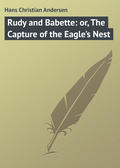
Ганс Христиан Андерсен
The Sand-Hills of Jutland
The Following Tales
ARE DEDICATED,
WITH THE HIGHEST SENTIMENTS OF
ESTEEM AND REGARD,
TO
THE BARON CHARLES JOACHIM HAMBRO,
BY
HANS CHRISTIAN ANDERSEN
The Sand-hills of Jutland
This is a story from the Jutland sand-hills, but it does not commence there; on the contrary, it commences far away towards the south, in Spain. The sea is the highway between the two countries. Fancy yourself there. The scenery is beautiful; the climate is warm. There blooms the scarlet pomegranate amidst the dark laurel trees; from the hills a refreshing breeze is wafted over the orange groves and the magnificent Moorish halls, with their gilded cupolas and their painted walls. Processions of children parade the streets with lights and waving banners; and, above these, clear and lofty rises the vault of heaven, studded with glittering stars. Songs and castanets are heard; youths and girls mingle in the dance under the blossoming acacias; whilst beggars sit upon the sculptured blocks of marble, and refresh themselves with the juicy water-melon. Life dozes here: it is all like a charming dream, and one indulges in it. Yes, thus did two young newly-married persons, who also possessed all the best gifts of earth – health, good humour, riches, and rank.
"Nothing could possibly exceed our happiness," they said in the fulness of their joyful hearts; yet there was one degree of still higher happiness to which they might attain, and that would be when God blessed them with a child – a son, to resemble them in features and in disposition.
That fortunate child would be hailed with rapture; would be loved and daintily cared for; would be the heir to all the advantages that wealth and high birth can bestow.
The days flew by as a continual festival to them.
"Life is a merciful gift of love – almost inconceivably great," said the young wife; "but the fulness of this happiness shall be tasted in that future life, when it will increase and exist to all eternity. The idea is incomprehensible to me."
"That is only an assumption among mankind," said her husband. "In reality, it is frightful pride and overweening arrogance to think that we shall live for ever – become like God. These were the serpent's wily words, and he is the father of lies."
"You do not, however, doubt that there is a life after this one?" asked his wife; and for the first time a cloud seemed to pass over their sunny heaven of thought.
"Faith holds forth the promise of it, and the priests proclaim it," said the young man; "but, in the midst of all my happiness, I feel that it would be too craving, too presumptuous, to demand another life after this one – a happiness to be continual. Is there not so much granted in this existence that we might and ought to be content with it?"
"To us – yes, there has been much granted," replied the young wife; "but to how many thousands does not this life become merely a heavy trial? How many are not, as it were, cast into this world to be the victims of poverty, wrangling, sickness, and misfortune? Nay, if there were no life after this one, then everything in this globe has been unequally dealt out; then God would not be just."
"The beggar down yonder has joys as great, to his ideas, as are those of the monarch in his splendid palace to him," said the young man; "and do you not think that the beasts of burden, which are beaten, starved, and toiled to death, feel the oppressiveness of their lot? They also might desire another life, and call it unjust that they had not been placed amidst a higher grade of beings."
"In the kingdom of heaven there are many mansions, Christ has told us," answered the lady. "The kingdom of heaven is infinite, as is the love of God. The beasts of the field are also His creation; and my belief is that no life will be extinguished, but will win that degree of happiness which may be suitable to it, and that will be sufficient."
"Well, this world is enough for me," said her husband, as he threw his arms round his beautiful, amiable wife, and smoked his cigarette upon the open balcony, where the deliciously cool air was laden with the perfume of orange trees and beds of carnations. Music and the sound of castanets arose from the street beneath; the stars shone brightly above; and two eyes full of affection, the eyes of his charming wife, looked at him with love which would live in eternity.
"Such moments as these," he exclaimed, "are they not well worth being born for – born to enjoy them, and then to vanish into nothingness?"
He smiled; his wife lifted her hand and shook it at him with a gesture of mild reproach, and the cloud had passed over – they were too happy.
Everything seemed to unite for their advancement in honour, in happiness, and in prosperity. There came a change, but in place – not in anything to affect their well-being, to damp their joy, or to ruffle the smooth current of their lives. The young nobleman was appointed by his king ambassador to the court of Russia. It was a post of honour to which he was entitled by his birth and education. He had a large private fortune, and his young wife had brought him one not inferior to his own, for she was the daughter of one of the richest men in the kingdom. A large ship was about that time to go to Stockholm. It was selected to convey the rich man's dear daughter and son-in-law to St. Petersburg; and its cabin was fitted up as if for the use of royalty – soft carpets under the feet, silken hangings, and every luxury around.
Amidst the ancient Scandinavian ballads, known to all Danes under their general title of Kœmpeviser, there is one called "The King of England's Son." He likewise sailed in a costly ship; its anchor was inlaid with pure gold, and every rope was of twisted silk. Every one who saw the Spanish vessel must have remembered the ship in this legend, for there was the same pageantry, the same thoughts on their departure.
"God, let us meet again in joy!"
The wind blew freshly from off the Spanish shore, and the last adieux were therefore hurried; but in a few weeks they would reach their destination. They had not gone far, however, before the wind lulled, the sea became calm, its surface sparkled, the stars above shone brightly, and all was serenity in the splendid cabin.
At length they became tired of the continued calm, and wished that the breeze would rise and swell into a good strong wind, if it would only be fair for them; but they still lacked wind, and if it did arise, it was always a contrary one. Thus passed weeks, and when at length the wind became fair, and blew from the south-west, they were half way between Scotland and Jutland. Just then the wind shifted, and increased to a gale, as it is described to have done in the ballad of "The King of England's Son."
"The sky grew dark, and the wind it blew,
They could see neither land nor haven of rest;
So then they cast out their anchor true,
But to Denmark they drove with the gale from the west."
This was many years ago. King Christian the Seventh occupied the Danish throne, and was then a young man. Much has happened since that time, much has changed; lakes and morasses have become fruitful meadows, wild moors have become cultivated land, and on the lee of the West Jutlander's house grow apple trees and roses; but they must be sheltered from the sharp west winds. Up there one can still, however, fancy one's self back in the period of Christian the Seventh's reign. As then in Jutland, so even now, stretch for miles and miles the brown heaths, with their tumuli, their meteors, their knolly, sandy cross roads. Towards the west, where large streams fall into the fiords, are to be seen wide plains and bogs, encircled by high hills, which, like a row of Alpine mountains with pinnacles formed like saws, frown over the sea, which is separated from them only by high clay banks; and year after year the sea bites a large mouthful off of these, so that their edges and summits topple over as if shaken by an earthquake. Thus they look at this day, and thus they were many years ago, when the happy young couple sailed from Spain in the magnificent ship.
It was the end of September. It was Sunday and sunshine: the sound of the church bells reached afar, even to Nissumfiord. The churches up there were like rocks with spaces hewn out in them: each one of them was like a piece of a mountain, so heavy and massive. The German Ocean might have rolled over them, and they would have stood firmly. Many of them had no spires or towers, and the bells hung out in the open air between two beams. The church service was over. The congregation had passed from the house of God out into the churchyard, where then, as now, not a tree, not a bush was to be seen – not a single flower, not a garland laid upon a grave. Little knolls or heaps of earth point out where the dead are buried; a sharp kind of grass, lashed by the wind, grows over the whole churchyard. A solitary grave here and there has, perhaps, a monument; that is to say, the mouldering trunk of a tree, rudely carved into the shape of a coffin. The pieces of tree are brought from the woods of the west. The wild ocean provides, for the dwellers on the coast, beams, planks, and trees, which the dashing billows cast upon the shore. The wind and the sea spray soon decay these tree monuments. Such a stump was lying over the grave of a child, and one of the women who had come out of the church went towards it. She stood gazing upon the partially loosened piece of wood. Shortly afterwards her husband joined her. They remained for a time without either of them uttering a single word; then he took her hand, and led her from the grave out upon the heath, across the moor, in the direction of the sand-hills. For a long time they walked in silence. At last the husband said, —
"It was an excellent sermon to-day. If we had not our Lord we should have nothing."
"Yes," said the wife, "He sends joy, and He sends affliction. He is right in all things. To-morrow our little boy would have been five years old if he had been spared to us."
"There is no use in your grieving for his loss," replied the husband. "He has escaped much evil. He is now where we must pray to be also received."
They dropped the painful subject, and pursued their way towards their house amidst the sand-hills. Suddenly, from one of these where there was no lyme-grass to keep down the sand, there arose as it were a thick smoke. It was a furious gust of wind, that had pierced the sand-hill, and whirled about in the air the fine particles of sand. The wind veered round for a minute; and all the dried fish that was hung up on cords outside of the house knocked against its walls, then everything was still again. The sun was shining warmly.
The man and his wife entered their house, and having soon divested themselves of their Sunday clothes, they hastened over the sand-hills, which stood like enormous waves of sand suddenly arrested in their course. The sea-reed's and the lyme-grass's blue-green sharp blades gave some variety to the white sand. Some neighbours joined the couple who had just come from church, and they assisted each other in dragging the boats higher up the beach. The gale was increasing; it was bitterly cold; and when they were returning over the hills, the sand and small stones whisked into their faces, the waves mounted high with their white crests, and the spray dashed after them.
It was evening; there was a doleful whistling in the air, increasing every moment – a wild howling, as if a host of unseen despairing spirits were uttering their complaints. The moaning sound overpowered even the angry dashing of the waves, although the fisherman's house lay so near to the shore. The sand drifted against the windows, and every now and then came a blast that shook the house to its foundation. It was very dark, but the moon would rise at midnight.
The air cleared; yet the storm still raged in all its might over the deep gloomy sea. The fishermen and their families had retired for some time to rest, but no one could close his eyes in such terrible weather. Some one knocked at the windows of some of the cottages, and when the doors were opened the person said, —
"A large ship is lying fast upon the outer shoal."
In a moment the fishermen and their wives were up and dressed.
The moon had risen, and there was light enough to see if they had not been blinded by the sand that was flying about. The wind was so strong that they were obliged to lie down, and creep amidst the gusts over the sand-hills; and there flew through the air, like swan's down, the salt foam and spray from the sea, which, like a roaring, boiling cataract, dashed upon the beach. A practised eye was required to discern quickly the vessel outside. It was a large ship; it was lifted a few cable lengths forward, then driven on towards the land, struck upon the inner sand-bank, and stood fast. It was impossible to go to the assistance of the ship, the sea was running too high: it beat against the unfortunate vessel, and dashed over her. The people on shore thought that they heard cries of distress – cries of those in the agony of death; and they saw the desperate, useless activity on board. Then came a sea that, like a crushing avalanche, fell upon the bowsprit, and it was gone. The stern of the vessel rose high above the water – two people sprang from it together into the sea – a moment, and one of the most gigantic billows that were rolling up against the sand-hills cast a body upon the shore: it was that of a female, and every one believed it was a corpse. Two women, however, knelt down by the body, and thinking that they found in it some sign of life, it was carried over the sand-hills to a fisherman's house. How beautiful she was, and how handsomely dressed! – evidently a lady of rank.
They placed her in the humble bed; there was no linen on it, only blankets to wrap her in, yet these were very warm.
She soon came to life, but was in a high fever. She did not seem to know what had happened, or to remark where she was; and this was probably fortunate, since all who were dear to her on board the ill-fated ship were lying at the bottom of the sea. It had been with them as described in the song, "The King of England's Son: " —
"It was, in sooth, a piteous sight!
The ship broke up to bits that night."
Portions of the wreck were washed ashore. She was the only living creature out of all that had so lately breathed and moved on board the doomed ship. The wind was howling their requiem over the inhospitable coast. For a few minutes she slept peacefully, but soon she awoke and uttered groans of pain; she cast up her beautiful eyes towards heaven, and said a few words, but no one there could understand them.
Another helpless being soon made its appearance, and her new-born babe was placed in her arms. It ought to have reposed on a stately couch, with silken curtains, in a splendid house. It ought to have been welcomed with joy to a life rich in all this world's goods; but our Lord had ordained that it should be born in a peasant's hut, in a miserable nook. Not even one kiss did it receive from its mother.
The fisherman's wife laid the infant on its mother's breast, and it rested near her heart; but that heart had ceased to beat – she was dead! The child who should have been nurtured amidst happiness and wealth was cast a stranger into the world – thrown up by the sea among the sand-hills, to experience heavy days and the fate of the poor. And again we call to mind the old song: —
"The king's son's eyes with big tears fill:
'Alas! that I came to this robber-hill.
Here nothing awaits me but evil and pain.
Had I haply but come to Herr Buggé's domain,
Neither knight nor squire would have treated me ill.'"
A little to the south of Nissumfiord, on that portion of the shore which Herr Buggé had formerly called his, the vessel had stranded. Those rough, inhuman times, when the inhabitants of the west coast dealt cruelly, it is said, with the shipwrecked, had long passed away; and now the utmost compassion was felt, and the kindest attention paid to those whom the engulfing sea had spared. The dying mother and the forlorn child would have met with every care wherever "the wild wind had blown;" but nowhere could they have been received with more cordial kindness than by the poor fishwife who, only the previous morning, had stood with a heavy heart by the grave wherein reposed her child, who on that very day would have attained his fifth year if the Almighty had permitted him to live.
No one knew who the foreign dead woman was, or whence she came. The broken planks and fragments of the ship told nothing.
In Spain, at that opulent house, there never arrived either letter or message from the daughter and son-in-law; they had not reached their destination; fearful storms had raged for some weeks. They waited with anxiety for months. At last they heard, "Totally lost – every one on board perished!"
But at Huusby-Klitter, in the fisherman's cottage, there dwelt now a little urchin.
Where God bestows food for two, there is always something for a third; and near the sea there is plenty of fish to be found. The little stranger was named Jörgen.
"He is surely a Jewish child," said some people, "he has so dark a complexion."
"He may, however, be an Italian or a Spaniard," said the priest.
The whole tribe of fishermen and women comforted themselves that, whatever was his origin, the child had received Christian baptism. The boy throve, his noble blood mantled in his cheek, and he grew strong, notwithstanding poor living. The Danish language, as it is spoken in West Jutland, became his mother tongue. The pomegranate seed from the Spanish soil became the coarse grass on the west coast of Jutland. Such are the vicissitudes of life!
To that home he attached himself with his young life's roots. Hunger and cold, the poor man's toil and want, he was to experience, but also the poor man's joys.
Childhood has its bright periods, which shine in recollection through the whole of after life. How much had he not to amuse him, and to play with! The entire seashore, for miles in length, was covered with playthings for him – a mosaic of pebbles red as coral, yellow as amber, and pure white, round as birds' eggs, all smoothed and polished by the sea. Even the scales of the dried fish, the aquatic plants dried by the wind, the shining seaweed fluttering among the rocks – all were pleasant to his eye, and matter for his thoughts; and the boy was an excitable, clever child. Much genius and great abilities lay dormant in him. How well he remembered all the stories and old ballads he heard; and he was very quick with his fingers. With stones and shells he would plan out whole scenes he had heard as if in a picture: one might have ornamented a room with these handiworks of his. "He could cut out his thoughts with a stick," said his foster-mother; and yet he was but a little boy. His voice was very sweet – melody seemed to have been born with him. There were many finely-toned strings in that breast; they might have sounded forth in the world, had his lot been otherwise cast than in a fisherman's house on the shores of the German Ocean.
One day a ship foundered near. A case was thrown up on the land containing a number of flower-bulbs. Some took them and put them into their cooking pots, thinking they were to be eaten; others were left to rot upon the sand; none of them fulfilled their destination – to unfold the lovely colours, the beauty that lay in them. Would it be better with Jörgen? The poor flower-roots were soon done for: there might be years of trial before him.
It never occurred to him, or to any of the people around him, to think their days lonely and monotonous: there was abundance to do, to hear, and to see. The ocean itself was a great book; every day he read a new page in it – the calm, the swell of the sea, the breeze, the storm. The beach was his favourite resort; going to church was his event, his visit of importance, though of visits there was one which occasionally took place at the fisherman's house that was particularly welcome to him. Twice a year his foster-mother's brother, the eel-man from Fjaltring, up near Rovbierg, paid them a visit. He came in a painted cart full of eels. The cart was closed and locked like a chest, and painted with blue, red, and white tulips; it was drawn by two dun-coloured bullocks, and Jörgen was allowed to drive them.
The eel-man was a very good-natured, lively guest. He always brought a keg of brandy with him; every one got a dram of it, or a coffee-cup full if glasses were scarce; even Jörgen, though he was but a little fellow, was treated to a good thimbleful. That was to keep down the fat eels, said the eel-man; and then he never failed to tell a story he had often told before, and, when people laughed at it, he immediately told it over again to the same persons; but this is a habit with all talkative individuals; and as Jörgen, during the whole time that he was growing up, and into the years of his manhood, often quoted phrases in this story, and applied them to himself, we may as well listen to it.
"Out in the rivulet dwelt eels, and the eel-mother said to her daughters, when they begged to be allowed to go a little way alone up the stream. 'Do not go far, lest the horrible eel-spearer should come, and take you all away.'
"But they went very far, and of eight daughters only three returned to their mother, and these came wailing, 'We only went a short way from the door, when the terrible eel-spearer came and killed our five sisters.' 'They will come back again,' said the eel-mother. 'No,' said the daughters, 'for he skinned them, cut them in pieces, and fried them.' 'They will come again,' repeated the mother. 'Impossible, for he ate them.' 'They will come again,' still persisted the eel-mother. 'But he drank brandy after he had eaten them,' said the daughter. 'Did he? Oh! oh! then they will never come again,' howled the mother. 'Brandy buries eels.'
"And therefore one must always drink a little brandy after that dish," said the eel-man.
And this story made a great impression on little Jörgen, and partly influenced his life. He took the tinsel for the gold. He also wished to go "a little way up the stream" – that is to say, to go away in a ship to see the world – and his mother said as the eel-mother had done. "There are many bad men – eel-spearers." But a little way beyond the sand-hills, and a little way on the heath, he was allowed to go, he begged so hard. Four happy days, however – days that seemed the brightest among his childish years, turned up: he was to go to a large meeting. What pleasure, although it was to a funeral!
A relation of the fisherman's family, who had been in easy circumstances, was dead. The farm lay inland – "eastward, a little to the north," it was said. The father and mother were both going, and Jörgen was to accompany them. On leaving the sand-hills, they passed over heaths and boggy lands, until they came to the green meadows where Skjærumaa winds its way – the river with the numerous eels, where the eel-mother with her daughters lived, those whom the cruel man speared and cut in pieces, though there were men who had scarcely treated their fellow-men better. Even Herr Buggé, the knight who was celebrated in the old song, was murdered by a wicked man; and though he was himself called so good, he wished to put to death the builder who had built for him his castle, with its tower and thick walls, just where Jörgen and his foster-parents stood, where Skjærumaa falls into the Nissumfiord. The sloping bank or ascent to the ramparts was still to be seen, and red fragments of the walls still marked out the circumference of the ancient building. Here had Herr Buggé, when the builder had taken his departure, said to his squire – "Follow him, and say, Master, the tower leans to one side. If he turns, slay him on the spot, and take the money from him that he got from me; but, if he does not turn, let him go on in peace." And the squire overtook the builder, and said what he was ordered to say; and the builder replied, "The tower does not lean to one side, but by and by there will come from the westward one in a blue cloak, and he will make it bend." A hundred years afterwards this prediction was fulfilled, for the German Ocean rushed in, and the tower fell; but the then owner of the property, Prebjörn Gyldenstierne, erected a habitation higher up, and that stands now, and is called Nörre-Vosborg.
Jörgen, with his foster-parents, had to pass this place. Of every little town hereabout he had heard stories during the long winter evenings; now he saw the castle, with its double moats, its trees and bushes, its ramparts overgrown with bracken. But the most beautiful sight was the lofty linden trees, that filled the air with so sweet a perfume. Towards the north-west, in a corner of the garden, stood a large bush with flowers that were like winter's snow amidst summer's green. It was an elder tree, the first Jörgen had ever seen in bloom. That and the linden trees were always remembered during his future years as Denmark's sweetest perfume and beauty, which the soul of childhood "for the old man laid by."
The journey soon became more extended, and the country less wild. After passing Nörre-Vosborg, where the elder tree was in bloom, he had the pleasure of travelling in a sort of carriage, for they met some of the other guests who were going to the funeral feast, as it might be called, and were invited into their conveyance. To be sure they had all three to stuff themselves into a very narrow back seat, but that was better, they thought, than walking. They drove over the uneven heaths; the bullocks which drew their cart stopped whenever they came to a little patch of green grass among the heather. The sun was shining warmly, and it was wonderful to see, far in the distance, a smoke that undulated, yet was clearer than the air – one could see through it: it was as if rays of light were rolling and dancing over the heath.
"It is the Lokéman, who is driving his sheep," was told Jörgen, and that was enough for him. He fancied he was driving into the land of marvellous adventures and fairy tales; yet he was only amidst realities. How still it was there!
Far before them stretched the heath, but it looked like a beautifully variegated carpet; the ling was in flower, the Cyprus-green juniper bushes and the fresh oak shoots seemed like bouquets among the heather. But for the many poisonous vipers, how delightful it would have been to roll about there! The party spoke of them, and of the numerous wolves that had abounded in that neighbourhood, on account of which the district was called Ulvborg-Herred. The old man who was driving related how, in his father's time, the horses had often to fight a hard battle with these now extirpated wild animals; and that one morning, on coming out, he found one of his horses treading upon a wolf he had killed; but the flesh was entirely stripped from the horse's legs.
Too quickly for Jörgen did they drive over the uneven heath, and through the deep sand. They stopped at length before the house of mourning, which was crowded with strangers, some inside, some on the outside. Vehicle after vehicle stood together; the horses and oxen were turned out amidst the meagre grass; large sand-hills, like those at home by the German Ocean, were to be seen behind the farm, and stretched far away in wide long ranges. How had they come there, twelve miles inland, and nearly as high and as large as those near the shore? The wind had lifted them and removed them: they also had their history.
Psalms were sung, and tears were shed by some of the old people, otherwise all was very pleasant thought Jörgen. Here was plenty to eat and drink – the nicest fat eels; and it was necessary to drink brandy-snaps after eating them, "to keep them down," the eel-man had said; and his words were acted upon here with all due honour.
Jörgen was in, and Jörgen was out. By the third day he felt himself as much at home here as he had done in the fisherman's cottage, where he had lived all his earlier days. Up here on the heath it was different from down there, but it was very nice. It was covered with heather-bells and bilberries; they were so large and so sweet; one could mash them with one's foot, so that the heather should be dripping with the red juice. Here lay one tumulus, there another; columns of smoke arose in the calm air; it was the heath on fire, they said, it shone brightly in the evening.
The fourth day came, and the funeral solemnities were over – the fisherman and his family were to leave the land sand-hills for the strand sand-hills.
"Ours are the largest though;" said the father, "these are not at all important-looking."
And the conversation fell on how they came there, and it was all very intelligible and very rational. A body had been found on the beach, and the peasants had buried it in the churchyard; then commenced a drifting of sand – the sea broke wildly on the shore, and a man in the parish who was noted for his sagacity advised that the grave should be opened, to ascertain if the buried corpse lay and sucked his thumb; for if he did that, it was a merman whom they had buried, and the sea would force its way up to take him back. The grave was accordingly opened, and lo! he they had buried was found sucking his thumb; so they took him up instantly, placed him on a car, harnessed two oxen to it, and dragged him over heaths and bogs out to the sea; then the sand drift stopped, but the sand-hills have always remained. To all this Jörgen listened eagerly; and he treasured this ancient legend in his memory, along with all that had happened during the pleasantest days of his childhood – the days of the funeral feast.
It was delightful to go from home, and to see new places and new people; and he was to go still farther away. He went on board a ship. He went forth to see what the world produced; and he found bad weather, rough seas, evils dispositions, and harsh masters. He went as a cabin-boy! Poor living, cold nights, the rope's end, and hard thumps with the fist were his portion. There was something in his noble Spanish blood which always boiled up, so that angry words rose often to his lips; but he was wise enough to keep them back, and he felt pretty much like an eel being skinned, cut up, and laid on the pan.







